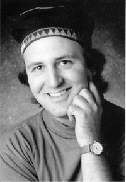Creeley and Aging
In a reading here two weeks ago, Robert Creeley primarily read works having to do with being 76 years old, with feeling that age quite literally as physical fact, and with having those years of experience, memories, that are another kind of weight, although one allowing entry, filtering, exploration, in short, another kind of experience with time. Much of the work from this reading has been published in a new chax press chapbook by Creeley, titled Yesterdays.
Some people commented to me afterwards that they found the reading depressing, yet as I have gone over and over the poems, I don't see any hint of depression, unless depression is simply the dropping of chipper optimism, but I don't think it is. I think, rather, that these poems of Creeley's, and their physical presentation in a reading, provide a mirror to the audience. If someone brings an attitude of depression to the experience of advanced age, then one will be depressed by the reading, the work. But there is no such depression in the work.
In a similar vein, many of Emily Dickinson's poems are about death, and many student readers in classes I have taught speak of these poems as morbid, yet I find no sense of morbidity whatsoever in Dickinson's attitudes in the poems ("Because I Could Not Stop For Death," "I Heard a Fly Buzz," and others). Again, the reader finds her/his own attitudes about death returned to her/him. Is this simply "bad reading," or is this what reading is all about, and possibly what all poems do?


0 Comments:
Post a Comment
<< Home